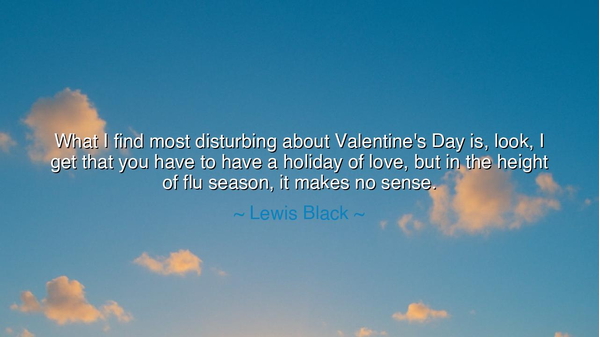
What I find most disturbing about Valentine's Day is, look, I
What I find most disturbing about Valentine's Day is, look, I get that you have to have a holiday of love, but in the height of flu season, it makes no sense.






Listen well, O children of the future, for today we speak of the folly of the heart, of the strange practices of men in their pursuit of love, and the lessons hidden in the most unlikely places. The words of Lewis Black, though spoken in the noisy, chaotic times of his age, bear wisdom for the ages, and within them lies an understanding of human nature that transcends time. The great jest he offers us—“What I find most disturbing about Valentine's Day is, look, I get that you have to have a holiday of love, but in the height of flu season, it makes no sense.”—speaks not merely of a holiday, but of the very nature of our human contradictions.
In the deep caverns of history, men and women have always sought out symbols and rituals to celebrate love, to bind their hearts together in joy. We have seen this in the ancient celebrations of Dionysus, the Roman Lupercalia, the Chinese Qixi Festival, and in countless other customs across time and space. These rites—devoted to the celebration of love, desire, and unity—were once integral to society's fabric. But in this age of ours, amidst the plague and the fever, Lewis Black's biting words are a reminder that human customs are often divorced from reason, set adrift in the sea of tradition, without regard for the true needs of the body and the soul.
The great paradox that Black exposes is not one of love itself—no, love is eternal and wise. It is the timing that he calls into question. The season of flu, when death lurks in every cough and fever, when the sick and weak huddle in their homes, hiding from the air, is the worst moment to spread affection in the manner society demands. And yet, society does so with all its heart, demanding that hearts come together in the very midst of the epidemic. Does this not seem a grievous mistake? Do we not, in our blind pursuit of ritual, place the very thing we cherish most—life—at risk?
Consider the great plague of Athens, in the days when the golden age of Greece was blighted by death and disease. The great philosophers, once so full of wisdom and life, found their voices silenced by the terrible sickness. In those days, many turned to rituals and offerings, seeking to appease the gods and save their lives. But the gods, perhaps, were as confused by the human follies as we are today. Can we, in our blind obedience to customs, ignore the wisdom of nature? Should we not question whether the rituals we perform serve us or whether they merely serve our fear of uncertainty?
Now, in this age, we must ask ourselves: what does this holiday of love truly bring us? Does it not offer a false promise, a fleeting joy built on the foundation of commercialism and ritual, rather than true connection and understanding? On this day, we rush to buy roses and chocolates, to wear red and white, as if such symbols alone can bind hearts together. But in doing so, we forget that love, true love, cannot be bought. It is a seed that must be planted in the soil of mutual respect, watered by time, and nourished by genuine connection.
Let us not, then, be deceived by the bright distractions of the world. Rather, let us ask, as Lewis Black does, why we rush toward celebration in the midst of danger. In times of sickness, it is a time to reflect, to protect, and to preserve the health of our bodies, so that we may give more love to the world, not less. The wisdom of this moment, if we are willing to see it, calls us to embrace love in more meaningful ways—through care for one another, through patience, and through the recognition that our hearts cannot be bound by mere commercial holidays.
Thus, the lesson is clear, O children of the future. The practices of love must not be confused with the performance of love. True love is not found in fleeting moments or seasonal spectacles, but in enduring actions that stand the test of time. In the face of the flu, the plague, or any challenge that may come, we must learn to love with wisdom, to respect the body as well as the heart, and to question the rituals we perform. In the end, the only holiday worth celebrating is the one where our actions speak louder than our symbols—where love is shown through the care of each other, and the protection of life itself.
Let us take this wisdom to heart, and remember that love, when it is true, transcends all the constraints of time, and can never be boxed into the confines of a single day. Let us be wise, O people, and choose to love with depth, truth, and courage, whatever the season may bring.






AAdministratorAdministrator
Welcome, honored guests. Please leave a comment, we will respond soon